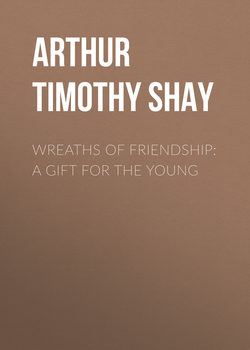Читать книгу Wreaths of Friendship: A Gift for the Young - Arthur Timothy Shay - Страница 7
HARSH WORDS AND KIND WORDS
ОглавлениеWilliam Baker, and his brother Thomas and sister Ellen, were playing on the green lawn in front of their mother's door, when a lad named Henry Green came along the road, and seeing the children enjoying themselves, opened the gate and came in. He was rather an ill-natured boy, and generally took more pleasure in teasing and annoying others, than in being happy with them. When William saw him coming in through the gate, he called to him and said, in a harsh way,
"You may just clear out, Henry Green, and go about your business! We don't want you here."
But Henry did not in the least regard what William said. He came directly forward, and joined in the sport as freely as if he had been invited instead of repulsed. In a little while he began to pull Ellen about rudely, and to push Thomas, so as nearly to throw them down upon the grass.
"Go home, Henry Green! Nobody sent for you! Nobody wants you here!" said William Baker, in quite an angry tone.
It was of no use, however. William might as well have spoken to the wind. His words were entirely unheeded by Henry, whose conduct became ruder and more offensive.
Mrs Baker, who sat at the window, saw and heard all that was passing. As soon as she could catch the eye of her excited son, she beckoned him to come to her, which he promptly did.
"Try kind words on him," she said; "you will find them more powerful than harsh words. You spoke very harshly to Henry when he came in, and I was sorry to hear it."
"It won't do any good, mother. He's a rude, bad boy, and I wish he would stay at home. Won't you make him go home?"
"First go and speak to him in a gentler way than you did just now. Try to subdue him with kindness."
William felt that he had been wrong in letting his angry feelings express themselves in angry words. So he left his mother and went down upon the lawn, where Henry was amusing himself by trying to trip the children with a long stick, as they ran about on the green.
"Henry," he said, cheerfully and pleasantly, "if you were fishing in the river, and I were to come and throw stones in where your line fell, and scare away all the fish, would you like it?"
"No, I should not," the lad replied.
"It wouldn't be kind in me?"
"No, of course it wouldn't."
"Well, now, Henry," William tried to smile and to speak very pleasantly, "we are playing here and trying to enjoy ourselves. Is it right for you to come and interrupt us by tripping our feet, pulling us about, and pushing us down? I am sure you will not think so if you reflect a moment. So don't do it any more, Henry."
"No, I will not," replied Henry, promptly. "I am sorry that I disturbed you. I didn't think what I was doing. And now I remember, father told me not to stay, and I must run home."
So Henry Green went quickly away, and the children were left to enjoy themselves.
"Didn't I tell you that kind words were more powerful than harsh words, William?" said his mother, after Henry had gone away; "when we speak harshly to our fellows, we arouse their angry feelings, and then evil spirits have power over them; but when we speak kindly, we affect them with gentleness, and good spirits flow into this latter state, and excite in them better thoughts and intentions. How quickly Henry changed, when you changed your manner and the character of your language. Do not forget this, my son. Do not forget, that kind words have double the power of harsh ones."
